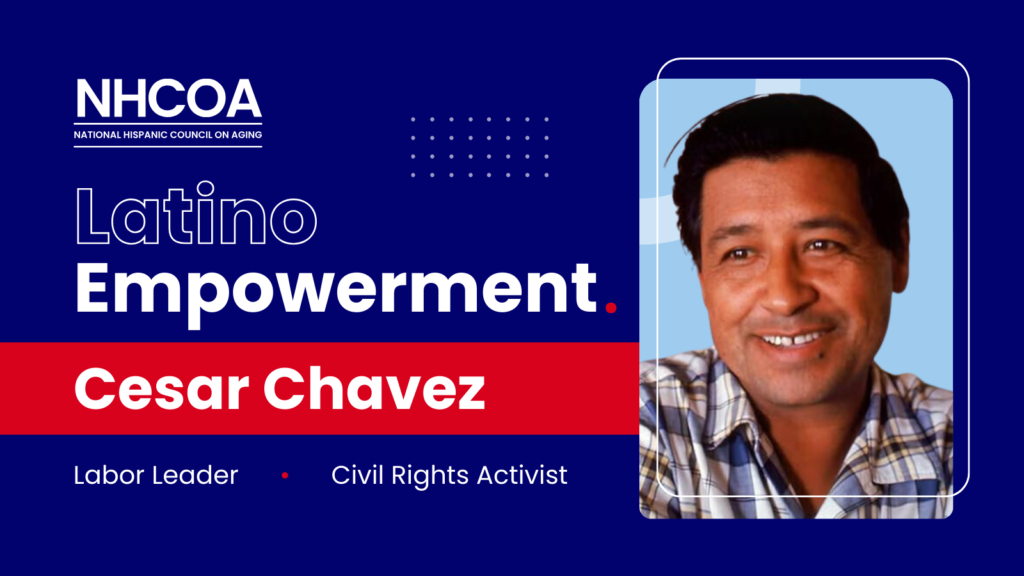
When we think of Latino Empowerment in the United States, it is fairly likely that the first name to come to mind will be César Chávez. He stood amongst such figures as Martin Luther King Jr., Reverend Jesse Jackson, and more, as a prolific organizer of nonviolent protests for civil rights. Rightly so, these figures have become figureheads to the American spirit of fighting for what you believe in, and the change you want to see in the world.
César Chávez, was born on March 31st, 1927, in Yuma, Arizona. He was a first generation American, raised by two Mexican immigrants who pursued farm work in the United States. What defined his childhood, and informed his incredible devotion to activism, was the struggle of his father to find financial security and independence. In what was a common experience for migrant farmers during the Great Depression, a land owner offered a deal to Chávez’s father, Librado, wherein he would clear 80 acres of land, and in exchange he would own 40 of those acres. However this deal was broken, and the land he cleared was sold to another. Librado bought the land back with a loan, but was then unable to pay the interest on the loan. In the end, he lost the land, providing what was likely the first event that gave César Chávez an understanding of injustice.
In 1938, Chávez and his family moved to California, working many fields across the state that they once again did not own, and did not receive proper compensation for. During this time, he continued to go to school, but his education was marred by a lack of cultural sensitivity, and general prejudice seen in his teachers. He would graduate eighth grade in 1942, and leave his life as a student to help his family in their farm work; his father, Librado, had been in an accident and was unable to work. Farm work and injustice were beginning to be the things that César knew best.
At 19 years old, Chávez joined a still segregated U.S. Navy in 1946, following the end of World War II. He would serve two years, returning in 1948, the same year that he married his wife, Helena Fabela. In 1952, he met a prolific organizer, Fred Ross, who had just founded the Community Service Organization (CSO) in 1948. Chávez worked with the CSO for ten years, working on initiatives like coordinating voter registration, and campaigns against racial and economic discrimination. Important as this work was, it did not speak to the generations of mistreatment that he had come to understand in his childhood and early adult life.
In 1962, Chávez uprooted his family, resigned from the CSO, and moved to Delano, California, a farm town. Here, he founded the National Farm Workers Association, which at the time was comprised only of himself, his wife, and his eight children. What followed were years of intense work to grow something that would last, and that would help people. This time, he wasn’t growing crops, but rather a social institution. It was during this time, in 1966, that the famous Delano Grape Strike took place, wherein grape-workers united in a 340-mile march from Delano to Sacramento. This was the first of a long line of nonviolent protests that César Chávez would become known for. These protestors were fighting to usher in laws that would permit them to unionize.
This protest would go on for years, and would include Chávez’s first hunger strike, where he only drank water for 25 days, in 1968. Protestors were under threat of violence, and this hunger strike was Chávez’s response: he would not eat until the violence stopped. By 1970, the fruits of his labor had shown: the protests ended, and Chávez had succeeded in unionizing most of the grape growing industry’s laborers, even reaching 50,000 members within the National Farm Workers Association.
César Chávez had become a beacon of hope for many, providing real evidence that with enough resolve, commitment, and work, you can change the circumstances that bind you. He grew up knowing the world for its restrictive injustice, but came to know himself and his community for their ability to make their voices known, to make their struggles answered, and to make their rights respected. Even at 61 years old, in 1988, he took it upon himself to fast for 36 days, to protest the use of agricultural pesticides that were poisoning workers at the time. He eventually passed in 1993, at 66 years old. At the time, he was living in a small village called San Luis, near Yuma, Arizona, where his life began.
References:
– “About Cesar Chavez,” Cesar Chavez Foundation. The Cesar Chavez Foundation. https://chavezfoundation.org/about-cesar-chavez/#1517518227969-596aaa83-bbbe
– “The Story of Cesar Chavez,” History. United Farm Workers. https://ufw.org/research/history/story-cesar-chavez/
– Britannica, T. Editors of Encyclopaedia. “Cesar Chavez.” Encyclopedia Britannica, July 31, 2024. https://www.britannica.com/biography/Cesar-Chavez

Recent Comments